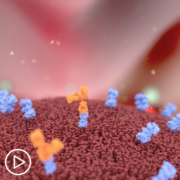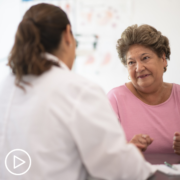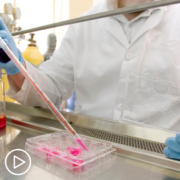Evolving Myeloma Treatment Options | Bispecific Antibody Therapy
Evolving Myeloma Treatment Options | Bispecific Antibody Therapy from Patient Empowerment Network on Vimeo.
What are bispecific antibodies, and how are they advancing myeloma care? Dr. Omar Nadeem of Dana-Farber Cancer Institute discusses the role of this new therapy in myeloma care, shares an update on ongoing bispecific antibody research, and compares this treatment to CAR T-cell therapy.
Dr. Omar Nadeem is the Clinical Director of the Myeloma Immune Effector Cell Therapy Program and Associate Director of the Multiple Myeloma Clinical Research Program at the Dana-Farber Cancer Institute. Learn more about Dr. Nadeem.
Related Resources:

What Is the Role of Bispecific Antibody Therapy in the Future of Myeloma Care? |

|

|
Transcript:
Katherine:
Well, another therapy that has emerged in myeloma is bispecific antibodies. What patient type is this therapy right for?
Dr. Nadeem:
So, bispecific antibodies are great because they’re off the shelf. What that means is that CAR-T cells, we first have to collect the T cells and we then have to send them off to be manufactured, and that manufacturing process can take up to a month, sometimes even longer, for some of the current available CAR-T products.
And then, after the cells are returned to the facility, we then give usually three days of chemotherapy to try to suppress some of the immune systems of the patients. So, that way, when the cells are administered, they can expand robustly and do essentially what they need to do.
So, that whole logistical process can take a couple of months by the time you identify somebody for CAR-T cells and then, from that moment until they can actually be treated. With bispecific antibodies, if we think somebody’s ready to go, you can basically get it as soon as we can have somebody ready to go either in our clinic or on the in-patient facility.
So, they’re much easier. They also utilize T cells to attack myeloma cells. We now have three approved bispecific antibodies. Two of them are targeting BCMA, the same exact target that we have in CAR-T cells, and one of them is now targeting a new target called GPRC5D, which is also highly expressed on myeloma cells.
So, having all these bispecific antibodies available is excellent because patients can have access to them a lot faster and now we’re trying to answer the question of sequencing. Can you give bispecific antibodies after CAR-T cells for example? Can you give one bispecific antibody after another, especially if there’s a different target that we now have available?
As a whole, though, bispecific antibodies tend to have lower response rates than CAR-T cells, particularly cilta-cel (Carvykti), which is cilta-cel that has a very high response rate of close to 100 percent.
Most bispecific antibodies have response rates somewhere around 70 or so percent, so about two-thirds of patients respond to these therapies, again, in that fifth line or four or more lines of therapy. So, in that space, that’s the response rate. And across the board, generally speaking, patients benefit from these bispecific antibodies approximately a year on average. Some of the studies have shown longer benefit, and it also depends somewhat on response to therapy.
Patients that have a really deep response can go even way longer than that. So, it is quite mixed in terms of how somebody may do on these bispecific antibodies, but those are the numbers.
Katherine:
Well, it sounds like bispecific antibodies have really transformed myeloma treatment options.
Dr. Nadeem:
Absolutely, and what goes hand in hand in this.
I mentioned the logistics of CAR T, but then there’s also the supply and availability of CAR-T cells. Since the approval, the demand for CAR-T cells has been very high because of all these excellent results, but the supply really hasn’t been there. So, even at a center as busy as ours, we can only treat a handful of patients with CAR T-cell therapies compared to bispecific antibodies, where that is essentially an injection similar to many other approved myeloma agents that you can just readily treat patients with. So, CAR-T cells, while I think, again, have higher efficacy, with that comes slightly higher toxicity as well. It’s a very different kind of treatment program.
And then, patients get a treatment-free interval, which you don’t see yet with bispecific antibodies. On the other hand, bispecific antibodies are readily available, slightly lower response rates, slightly lower toxicity when it comes to at least the traditional T-cell directing toxicities. And then you have, again, the readily available nature of it, which I think is hugely beneficial for patients.
Katherine:
You talked about some specifics regarding bispecific antibodies, but are there updates in bispecific antibody research that you’d like to share?
Dr. Nadeem:
Yeah, so, again, kind of following the theme of what we just said about CAR-T cells, can you bring these antibody therapies earlier? And there’s ongoing trials now looking at it in newly diagnosed multiple myeloma and early relapses, and then we presented our data at ASH this previous year looking at it in high-risk smoldering myeloma. We treated patients with teclistimab (Tecvayli), which is a BCMA bispecific antibody that is approved for relapse refractory patients. And what we demonstrated in that study is that people that got teclistimab had a 100 percent response rate with an MRD-negative rate. So, kind of as deep of a response as we can measure, also at 100 percent.
So, this is something that we had not seen before. When their immune systems are a lot healthier, they may benefit more. So, hopefully we’ll see confirmation of these results in other trials.
Particularly in the newly diagnosed space because we do think that these antibody therapies have such huge potential to treat patients, and then hopefully we’ll have durable responses. So, I do think that some of this paradigm may shift over the next few years, and then there’s also combinations that are currently being studied: combinations with traditional myeloma therapies, such as monoclonal antibodies, other immunomodulatory agents, or proteasome inhibitors. All these combination trials are now ongoing to see can you improve upon some of those numbers that I highlighted before with single-agent bispecific antibody therapy.
Katherine:
Can you share the pros and cons of bispecifics and how it compares to CAR T?”
Dr. Nadeem:
Yeah. I think we mentioned earlier that as a whole, they’re very similar. They’re both T-cell re-directing therapies, in many circumstances, with the same exact target of the myeloma cell, but because this isn’t a cell infusion – this is a cell injection – that you receive that redirects your T cells to the myeloma cells, you tend to see a little bit of a lower toxicity signal when it comes to the cytokine release syndrome incidents and severity. You see lower neurological toxicity, usually, than you do with CAR T-cell products as a whole.
With that comes slightly lower efficacy than you see with at least some of our CAR-T products, but if you respond to therapy, then the durability of response can be as good as you can achieve with CAR-T cells. One thing to note about the bispecifics, though, is that it is continuous therapy, so you are getting it on some regular schedule. Right now the approval is for it to be given weekly and then go to every two weeks after six months of therapy if you’re basically in a good response.
A lot of that is to try to mitigate the risk of infection. So, that is one of the biggest things that we have seen with bispecifics more so than CAR-T cells. Because it is continuous administration of these therapies, that really suppresses your immune system significantly, and infection rates are quite high. So, we typically give other ways to try to mitigate that using immunoglobulin infusions to try to boost up your immune system. Typically, we do that once a month for patients, making sure you’re on the right prophylactic medications and then really adjusting the therapy and the schedule to you depending on your tolerability.
So, as we said before, it’s an excellent option. I think bispecific antibodies are going to be the mainstay of myeloma therapy going forward because CAR-T cells, again, we can’t really treat everybody with CAR-T cells just simply because of the dynamics of how the process is. So, having the bispecific antibodies available for patients is excellent.









